|
Lessons from the Silicon Valley Bank Failure Since the failure of Silicon Valley Bank was announced after the market close on Friday, today could be a very volatile day on Wall Street. The stock futures are looking positive, based upon Federal Reserve support for certain banks (not all). However, if there is strength this week, it’s still a very good idea to implement the below-listed strategies – to be properly diversified with a system for rebalancing and protecting your wealth. Join us at the April 22-24, 2023 Retreat to learn very important systems and strategies to protect our wealth, and to transform our relationship with money. Don’t panic. Prepare. Below are 7 things we should know and do now. 1. Which Banks are Most at Risk? 2. What Happens to the People and Companies Who Have More than the FDIC Limit of Cash Held at Silicon Valley Bank? 3. What Can We Do to Protect Our Cash? 4. Be Wary of Emails and Social Media Ads in All Caps 5. Money Market Funds and Non-FDIC-Insured Bank Products, including Certificates of Deposit 6. Annuity and Life Insurance 7. Know What We Own in Our Retirement Plan and Brokerage Accounts Now And here are more details on each point. 1. Which Banks are Most at Risk? Below are a few banks and their current S&P Global credit rating. The bank stress tests are being conducted now and the results will be released at the end of June. Check the credit rating of the bank you do business with at SPGlobal.com. With so many banks at or near junk bond status, underweighting financials is a beneficial strategy. Silicon Valley Bank was still investment grade (BBB) with a stable rating as of November 10, 2022. S&P Global downgraded SVB to BBB- on March 9, 2023 (still investment grade). On March 10, 2023, the FDIC established receivership of the bank. In one of my February blogs, I outlined why banks are risky at this time. (click to access). We go into detail on how we can underweight financials in the funds we hold in our retirement and brokerage accounts at our April 22-24, 2023 Financial Empowerment Retreat. Email [email protected] to learn more and register now. 2. What Happens to the People and Companies Who Have More than the FDIC Limit of Cash Held at Silicon Valley Bank? While the FDIC, the Treasury Department and the Federal Reserve Bank issued a joint statement assuring depositors at SVB that they “will have access to all of their money starting Monday, March 13,” the statement by the FDIC clarified that insured depositors have all access, while “uninsured depositors will receive a receivership certificate for the remaining amount of their uninsured funds.” If you bank at SVB and have cash levels above the FDIC-insured limit (or just general interest), you can read the full FDIC statement at FDIC.gov. . 3. What Can We Do to Protect Our Cash? Check the cash levels that we are currently holding at various banks that we do business with. Consider having more than one bank holding our cash, particularly if our cash levels are well above the FDIC-insured limit of $250,000. Know the current credit rating of the banks. If we have our cash at a brokerage that is promising FDIC-insured coverage, know the limits on that claim. (Click to read my blog on the FTX and Voyager Digital failures, when FDIC-insured claims were null and void.) In that blog, I also discuss the credit ratings of a few brokerages. I would consider having more than one bank even if my current bank has a bank sweep program. It’s unlikely that SVB and Signature Bank are the only ones that are going to have serious trouble. Even the central bank is losing money at this time, due to the plunge in value of long-term bonds. According to the Sept. 21, 2022 minutes of the FOMC meeting, “Federal Reserve net income turned negative in September.” Net income is not expected to turn positive for a few years. Creditworthiness counts. 4. Be Wary of Emails and Social Media Ads in All Caps We’re already seeing rallies in crypto, gold and silver (the safe haven plays). We’re going to start seeing a lot of emails and social media ads warning of a central bank failure, and advising investors that these safe havens are the only solution. Is that the case? No. However, it is definitely a good idea to consider having a hot slice or two of a safe haven hedge against a downturn in stocks. (Learn our nest egg pie chart system at the April 22-24, 2023 online Financial Freedom Retreat.) Crypto investors will be thrilled if the SVB failure ends their horrific crypto winter, and gold/silver investors will be ecstatic if the decade-long doldrums finally snaps. However, even with safe haven plays, it’s important to understand the cycles and to never confuse a bull market or a rally with wisdom. Why shouldn’t you put all of your money into crypto, gold or silver? The first reason is volatility. If you use the pie chart system and are rebalancing regularly, then you have a way of capturing gains and buying low. Otherwise, your net worth and credit score could spend decades underwater. However, another very real risk is that the ruse you’re being offered is an outright scam – even if it is being promoted by a celebrity or well-known book author. Read my blog on the failure of FTX and SBF to learn more about avoiding these money pits. 5. Money Market Funds and Non-FDIC-Insured Bank Products, including Certificates of Deposit Money market funds, all insurance products (including annuities) and some CDs are not FDIC-insured. Money market funds can impose redemption gates and liquidity fees. Now is the time to look forensically at the holdings in your brokerage and retirement accounts and to become familiar with the fine print – what happens in times of distress. Clearly, this is no longer a theoretical warning. The shareholders and certain unsecured debt holders of Silicon Valley and Signature Banks are not being bailed out. Learn more in my blog on MMFs, FDIC and SIPC, and in What’s Safe? Section of The ABCs of Money, 5th edition. 6. Annuities and Life Insurance All financial services companies are at risk in recessions, particularly the current one, due to their exposure to long-term bonds and other high-risk, high-leverage products. Since annuities and life insurance are only guaranteed by the company that issues the product (and the state guaranty funds), it’s important to, at minimum, know the credit rating of the company that is making a promise to you. It’s also important to know how much debt, leverage and risk that the company is taking on through a qualified outside source (not just relying upon the company’s claims). We wouldn’t have many insurance companies if they weren’t bailed out in the Great Recession. This time around, taxpayers are not expected to be forced to shoulder that burden. We educate you more about annuities and life insurance in the Financial Freedom Retreat (where we spend one full day on what’s safe) and in The ABCs of Money, 5th edition. 7. Know What We Own in Our Retirement Plan and Brokerage Accounts Now It’s not a good idea to have blind faith that someone else is protecting our future for us, or to avoid looking at our retirement funds because we believe that we can’t really make changes or that we should just ride things out. Stocks have a history of dropping by more than half in the 21st Century recessions. In 2022, long-term government bonds dropped by -26%. So, even the “safe” side of our wealth plan is at risk. Most managed brokerage and retirement accounts shadow the performance of the general marketplace. Our easy-as-a-pie-chart diversification and rebalancing strategy earned gains in the Dot Com and Great Recessions and have outperformed the bull markets in between. Now is the time to be the boss of your money. Bottom Line Whether you learn our time-proven 21st century strategies in our bestselling books, receive an unbiased 2nd opinion personally from me (email [email protected] for pricing and details), or learn and implement these strategies after attending our April 22-24, 2023 Retreat, now is the time to protect our wealth. Email [email protected] for pricing and information, or visit the home page of NataliePace.com, where you’ll find links to our books, the April Retreat and much more. Email [email protected] or call 310-430-2397 if you are interested in learning time-proven investing, budgeting, debt reduction, college prep and home buying solutions that will transform your life at our next Financial Freedom Retreat. We spend one full day on what's safe, helping you to protect your wealth and reduce money stress. 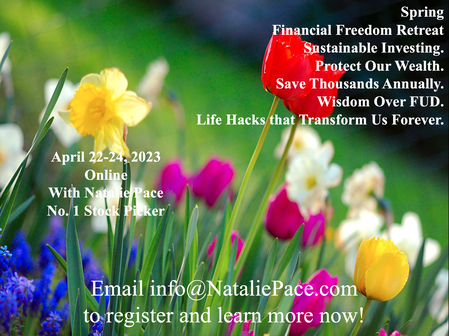 Join us for our Online Financial Freedom Retreat. April 22-24, 2023. Email [email protected] to learn more. Register with friends and family to receive the best price. Click for testimonials, pricing, hours & details. 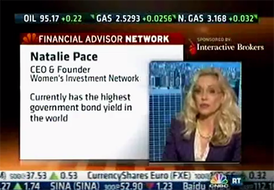 Natalie Wynne Pace is an Advocate for Sustainability, Financial Literacy & Women's Empowerment. Natalie is the bestselling author of The Power of 8 Billion: It's Up to Us and is the co-creator of the Earth Gratitude Project. She has been ranked as a No. 1 stock picker, above over 835 A-list pundits, by an independent tracking agency (TipsTraders). Her book The ABCs of Money remained at or near the #1 Investing Basics e-book on Amazon for over 3 years (in its vertical), with over 120,000 downloads and a mean 5-star ranking. The 5th edition of The ABCs of Money was released on September 17, 2021. Natalie Pace's easy as a pie chart nest egg strategies earned gains in the last two recessions and have outperformed the bull markets in between. That is why her Investor Educational Retreats, books and private coaching are enthusiastically recommended by Nobel Prize winning economist Gary S. Becker, TD AMERITRADE chairman Joe Moglia, Kay Koplovitz and many Main Street investors who have transformed their lives using her Thrive Budget and investing strategies. Click to view a video testimonial from Nilo Bolden. Check out Natalie Pace's Apple Podcast. Watch videoconferences and webinars on Youtube. Other Blogs of Interest The 2 Best Solar Stocks Which Countries Offer the Highest Yield for the Lowest Risk? Rebalance By the End of March Solar, EVs, Housing, HSAs -- the Highest-Yield in 2023? Are You Anxious or Depressed over Money? Why We Are Underweighting Banks and the Financial Industry. You Stream all the Channels. Should You Invest, Too? NASDAQ is Still Down -26%. Are Meta & Snap a Buy? 2023 Bond Strategy Emotions are Not Your Friend in Investing Investor IQ Test Investor IQ Test Answers Bonds Lost -26%, Silver Held Strong. 2023 Crystal Ball for Stocks, Bonds, Real Estate, Cannabis, Gold, Silver. Tilray: The Constellation Brands of Cannabis New Year, New Healthier You Tesla's $644 Billion Fall From Mars Silver's Quiet Rally. Free Holiday Gift. Stocking Stuffers Under $10. Cash Burn & Inflation Toasted the Plant-Based Protein Companies Save Thousands Annually With Smarter Energy Choices Is Your FDIC-Insured Cash Really Safe? Giving Tuesday Tips to Make Your Charitable Contribution a Triple Win. Is Your Pension Plan Stealing From You? The FTX Crypto Fall of a Billionaire (SBF). Crypto, Gold, Silver: Not So Safe Havens. Will Ted Lasso Save Christmas? 3Q will be Released This Thursday. Apple and the R Word. Yield is Back. But It's Tricky. The Real Reason Why OPEC Cut Oil Production. The Inflation Buster Budgeting and Investing Plan. No. Elon Musk Doesn't Live in a Boxabl. IRAs Offer More Freedom and Protection Than 401ks. Will There Be a Santa Rally 2022? What's Safe in a Debt World? Not Bonds. Will Your Favorite Chinese Company be Delisted? 75% of New Homeowners Have Buyer's Remorse Clean Energy Gets a Green Light from Congress. Fix Money Issues. Improve Your Relationships. 24% of House Sales Cancelled in the 2nd Quarter. 3 Things to Do Before July 28th. Recession Risks Rise + a Fairly Safe High-Yield Bond DAQO Doubles. Solar Shines. Which Company is Next in Line? Tesla Sales Disappoint. Asian EV Competition Heats Up. 10 Wealth Strategies of the Rich Copper Prices Plunge Colombia and Indonesia: Should You Invest? 10 Misleading Broker/Salesman Pitches. Why are Banks and Dividend Stocks Losing Money? ESG Investing: Missing the E. Bitcoin Crashes. Crypto, Gold and Stocks All Crash. The U.S. House Decriminalizes Cannabis Again. The Risk of Recession in 6 Charts. High Gas Prices How Will Russian Boycotts Effect U.S. Multinational Companies? Oil and Gas Trends During Wartime Russia Invades Ukraine. How Have Stocks Responded in Past Wars? 2022 Crystal Ball in Stocks, Real Estate, Crypto, Cannabis, Gold, Silver & More. Interview with the Chief Investment Strategist of Charles Schwab & Co., Inc. Stocks Enter a Correction Investor IQ Test Investor IQ Test Answers What's Safe in a Debt World? Money Market Funds, FDIC, SIPC: Are Any of Them Safe? My 24-Year-Old is Itching to Buy a Condo. Should I Help Him? The 12-Step Guide to Successful Investing. Gardeners Creating Sanctuary & Solutions in Food Deserts. The Bank Bail-in Plan on Your Dime. Rebalancing Your Nest Egg IQ Test. Answers to the Rebalancing Your Nest Egg IQ Test. Important Disclaimers Please note: Natalie Pace does not act or operate like a broker. She reports on financial news, and is one of the most trusted sources of financial literacy, education and forensic analysis in the world. Natalie Pace educates and informs individual investors to give investors a competitive edge in their personal decision-making. Any publicly traded companies or funds mentioned by Natalie Pace are not intended to be buy or sell recommendations. ALWAYS do your research and consult an experienced, reputable financial professional before buying or selling any security, and consider your long-term goals and strategies. Investors should NOT be all in on any asset class or individual stocks. Your retirement plan should reflect a diversified strategy, which has been designed with the assistance of a financial professional who is familiar with your goals, risk tolerance, tax needs and more. The "trading" portion of your portfolio should be a very small part of your investment strategy, and the amount of money you invest into individual companies should never be greater than your experience, wisdom, knowledge and patience. Information has been obtained from sources believed to be reliable. However, NataliePace.com does not warrant its completeness or accuracy. Opinions constitute our judgment as of the date of this publication and are subject to change without notice. This material is not intended as an offer or solicitation for the purchase or sale of any financial instrument. Securities, financial instruments or strategies mentioned herein may not be suitable for all investors. Comments are closed.
|
AuthorNatalie Pace is the co-creator of the Earth Gratitude Project and the author of The Power of 8 Billion: It's Up to Us, The ABCs of Money, The ABCs of Money for College, The Gratitude Game and Put Your Money Where Your Heart Is. She is a repeat guest & speaker on national news shows and stages. She has been ranked the No. 1 stock picker, above over 830 A-list pundits, by an independent tracking agency, and has been saving homes and nest eggs since 1999. Archives
July 2024
Categories |







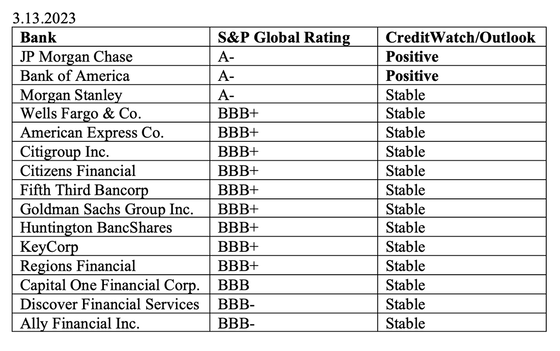
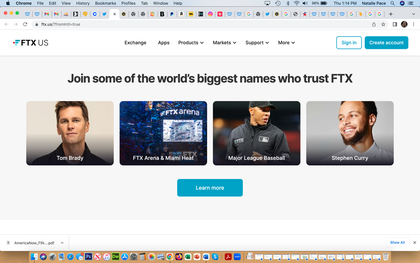
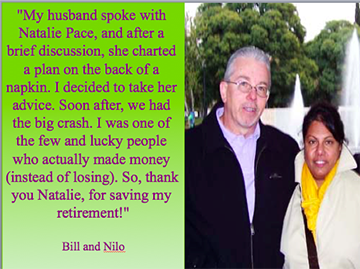
 RSS Feed
RSS Feed